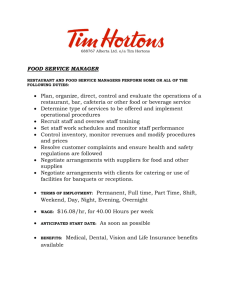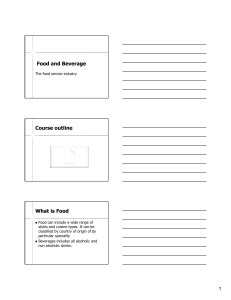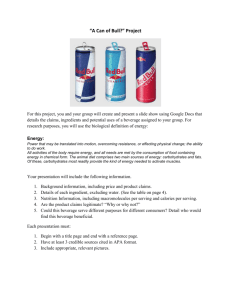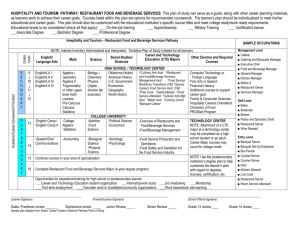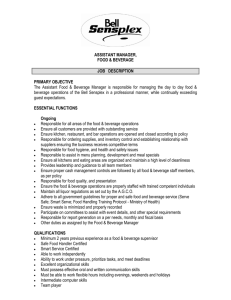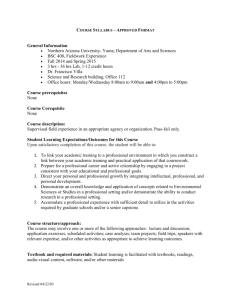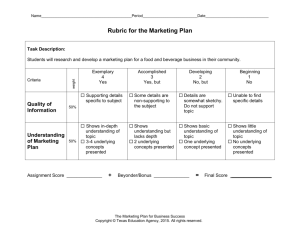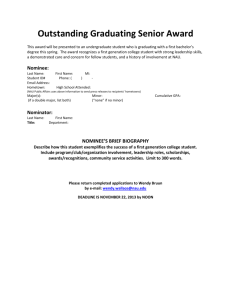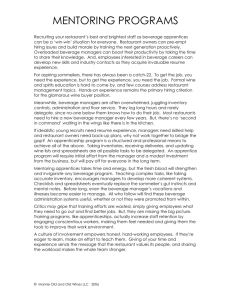HA 443 - nau.edu
advertisement
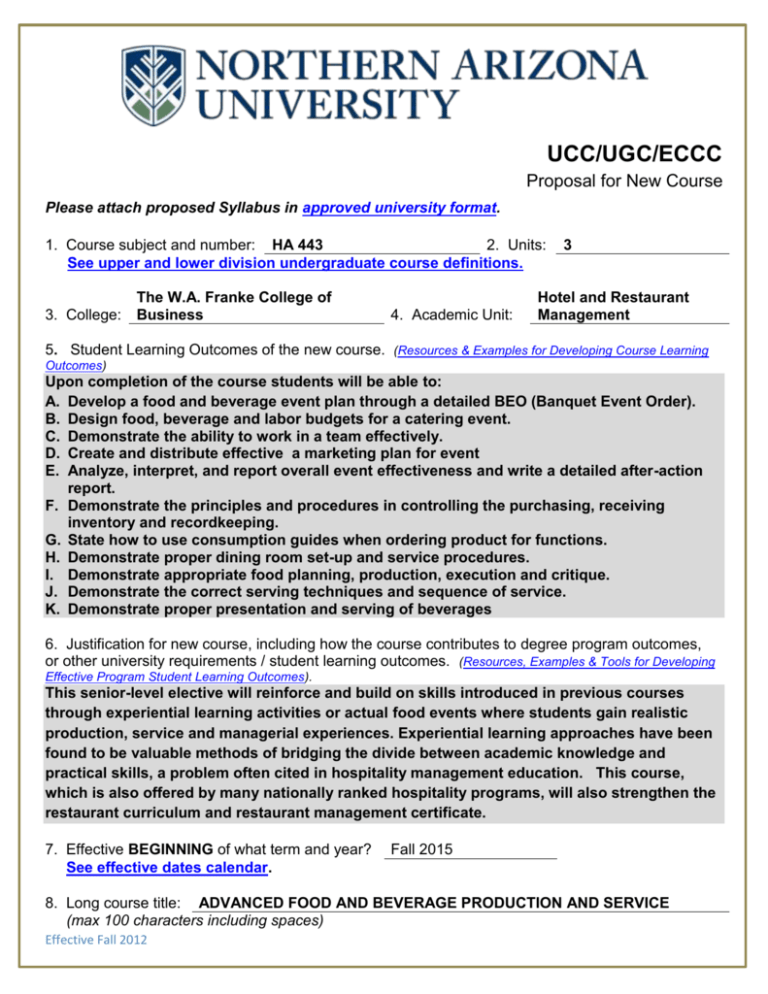
UCC/UGC/ECCC Proposal for New Course Please attach proposed Syllabus in approved university format. 1. Course subject and number: HA 443 2. Units: See upper and lower division undergraduate course definitions. 3. College: The W.A. Franke College of Business 4. Academic Unit: 3 Hotel and Restaurant Management 5. Student Learning Outcomes of the new course. (Resources & Examples for Developing Course Learning Outcomes) Upon completion of the course students will be able to: A. Develop a food and beverage event plan through a detailed BEO (Banquet Event Order). B. Design food, beverage and labor budgets for a catering event. C. Demonstrate the ability to work in a team effectively. D. Create and distribute effective a marketing plan for event E. Analyze, interpret, and report overall event effectiveness and write a detailed after-action report. F. Demonstrate the principles and procedures in controlling the purchasing, receiving inventory and recordkeeping. G. State how to use consumption guides when ordering product for functions. H. Demonstrate proper dining room set-up and service procedures. I. Demonstrate appropriate food planning, production, execution and critique. J. Demonstrate the correct serving techniques and sequence of service. K. Demonstrate proper presentation and serving of beverages 6. Justification for new course, including how the course contributes to degree program outcomes, or other university requirements / student learning outcomes. (Resources, Examples & Tools for Developing Effective Program Student Learning Outcomes). This senior-level elective will reinforce and build on skills introduced in previous courses through experiential learning activities or actual food events where students gain realistic production, service and managerial experiences. Experiential learning approaches have been found to be valuable methods of bridging the divide between academic knowledge and practical skills, a problem often cited in hospitality management education. This course, which is also offered by many nationally ranked hospitality programs, will also strengthen the restaurant curriculum and restaurant management certificate. 7. Effective BEGINNING of what term and year? See effective dates calendar. Fall 2015 8. Long course title: ADVANCED FOOD AND BEVERAGE PRODUCTION AND SERVICE (max 100 characters including spaces) Effective Fall 2012 9. Short course title: ADV FOOD & BEV PROD & SVC (max. 30 characters including spaces) 10. Catalog course description (max. 60 words, excluding requisites): This course provides hands-on opportunities for students to plan, prepare, execute, and analyze live food and beverage events in partnership with industry professionals. The skills and experiences received from this course will provide valuable, real-life opportunities for the student to exercise related theories and engage in providing guest service. Students will have the opportunity to apply skills and concepts learned in previous classes when executing each function. 11. Will this course be part of any plan (major, minor or certificate) or sub plan (emphasis)? Yes If yes, include the appropriate plan proposal. No 12. Does this course duplicate content of existing courses? Yes No If yes, list the courses with duplicate material. If the duplication is greater than 20%, explain why NAU should establish this course. 13. Will this course impact any other academic unit’s enrollment or plan(s)? Yes No If yes, describe the impact. If applicable, include evidence of notification to and/or response from each impacted academic unit 14. Grading option: Letter grade Pass/Fail Both 15. Co-convened with: 14a. UGC approval date*: (For example: ESE 450 and ESE 550) See co-convening policy. *Must be approved by UGC before UCC submission, and both course syllabi must be presented. 16. Cross-listed with: (For example: ES 450 and DIS 450) See cross listing policy. Please submit a single cross-listed syllabus that will be used for all cross-listed courses. 17. May course be repeated for additional units? 17a. If yes, maximum units allowed? 17b. If yes, may course be repeated for additional units in the same term? HA 243, HA 355 and ((Hotel & Restaurant Mgt (BS) or Intl Hospitality Mgt (BS) or Restaurant Management (CERT) or 18. Prerequisites: International Exchange Student Group)) If prerequisites, include the rationale for the prerequisites. Effective Fall 2012 Yes No Yes No Students require the Kitchen operation skills from HA 243 to prepare the meals in the class and the costing skills covered in HA 355 to cost and price the menu items for the class. 19. Co requisites: If co requisites, include the rationale for the co requisites. 20. Does this course include combined lecture and lab components? Yes If yes, include the units specific to each component in the course description above. No 21. Names of the current faculty qualified to teach this course: 22. Classes scheduled before the regular term begins and/or after the regular term ends may require additional action. Review “see description” and “see impacts” for “Classes Starting/Ending Outside Regular Term” under the heading “Forms” http://nau.edu/Registrar/Faculty-Resources/Schedule-of-Classes-Maintenance/. Do you anticipate this course will be scheduled outside the regular term? Yes No 23. Is this course being proposed for Liberal Studies designation? If yes, include a Liberal Studies proposal and syllabus with this proposal. Yes No 24. Is this course being proposed for Diversity designation? If yes, include a Diversity proposal and syllabus with this proposal. Yes No Answer 22-23 for UCC/ECCC only: FLAGSTAFF MOUNTAIN CAMPUS Scott Galland Reviewed by Curriculum Process Associate 12/15/2014 Date Approvals: Department Chair/Unit Head (if appropriate) Date Chair of college curriculum committee Date Dean of college Date For Committee use only: Effective Fall 2012 UCC/UGC Approval Approved as submitted: Approved as modified: Date Yes Yes No No EXTENDED CAMPUSES Reviewed by Curriculum Process Associate Date Approvals: Academic Unit Head Date Division Curriculum Committee (Yuma, Yavapai, or Personalized Learning) Date Division Administrator in Extended Campuses (Yuma, Yavapai, or Personalized Learning) Date Faculty Chair of Extended Campuses Curriculum Committee (Yuma, Yavapai, or Personalized Learning) Date Chief Academic Officer; Extended Campuses (or Designee) Date Approved as submitted: Approved as modified: Effective Fall 2012 Yes Yes No No MASTER SYLLABUS HA 443: Advanced Food and Beverage Production and Service (3 credit hours) I. Catalog Description: This course provides hands-on opportunities for students to plan, prepare, execute, and analyze live food and beverage events in partnership with industry professionals. The skills and experiences received from this course will provide valuable, real-life opportunities for the student to exercise related theories and engage in providing guest service. Students will have the opportunity to apply skills and concepts learned in previous classes when executing each function. II. Prerequisites: Admission to Hotel & Restaurant Mgt (BS) or Intl Hospitality Mgt (BS) or Restaurant Management (CERT) or International Exchange Student Group and Foundations in Kitchen Operations (HA 243) and Revenue Management and Cost Control for Restaurants (HA 355). Justification: Students require the Kitchen operation skills from HA 243 to prepare the meals in the class and the costing skills covered in HA 355 to cost and price the menu items for the class. III. Course Learning Outcomes: Upon completion of the course students will be able to: A. Develop a food and beverage event plan through a detailed BEO (Banquet Event Order). B. Design food, beverage and labor budgets for a catering event. C. Demonstrate the ability to work in a team effectively. D. Create and distribute effective a marketing plan for event E. Analyze, interpret, and report overall event effectiveness and write a detailed after-action report. F. Demonstrate the principles and procedures in controlling the purchasing, receiving inventory and recordkeeping. G. State how to use consumption guides when ordering product for functions. H. Demonstrate proper dining room set-up and service procedures. I. Demonstrate appropriate food planning, production, execution and critique. J. Demonstrate the correct serving techniques and sequence of service. K. Demonstrate proper presentation and serving of beverages Effective Fall 2012 IV. Course Materials: A text related to such as Quantity Food Production Planning and Management, Knight and Kotschevar, John Wiley & Sons, NJ. ISBN: 978-0-471-33347-0. V. Teaching Methods: The method of delivery of the course material will vary to facilitate the different ways students learn. The instruction methods will include, lecture, videos, discussion, guest speakers, demonstration and hands-on industry events. The students will plan, prepare, execute. and critique multiple functions. VI. Mechanisms for Feedback to Students/Interaction Between Students and Professors: Feedback will be provided by written comments on student assignments and exams, individual and group oral feedback, and class discussion about assignments and/or exam questions. VII. Evaluation Tools: Quizzes, exams, and three major projects. Course Requirements Course Learning Outcome A,DE,F,G,H,J,K A,B,D,G,H,I,J B,C,D,F,G,I,J,K A,B,D,E,HJ,K Grading System Grade Scale 10% 45% A B 90-100% 80-89.9% 15 % 30% 100 C D F 70-79.9% 60-69.9% 0-59.9% Assessment Activity Points % Chapter Quizzes Offsite Food service Operations Term Project and Event Practicums Food service Operation Analysis Exams Total 100 450 150 300 1000 VIII. Use of Technology and Information Systems: Students are required to use Microsoft products such as Word, Excel, and PowerPoint, as well as industry standard catering, recipe cost/inventory control and scheduling software. Bblearn will be used to house related information as well as quizzes, midterm and final exam. IX. Collaborative or Team Activities: The class utilizes group term projects and presentations in which they work alongside industry professionals to plan, prepare, execute, and critique three live catering events. X. Projects/Practicums: Students will complete three live catering events (practicums) in partnership with industry professionals rotating through three units: Top House, Front House and Back House. Their project will include planning, costing, marketing, production, service and critique of a catering event. XI. University Policies and Statement Regarding Academic Dishonesty: Current university required policies will be attached each term to actual syllabi. Students are responsible to inform themselves of university policies regarding Academic Integrity. In general, Effective Fall 2012 students found to be in violation of the code (e.g., cheating, fabrication, fraud, and plagiarism) are awarded a grade of F in the course. The complete policy on academic integrity is in Appendix F of NAU’s Student Handbook. NAU Policies can be found at: http://nau.edu/University-College/Liberal-Studies/_Forms/SyllabusPolicyStmts2-2014/. XII. Course Content: Course Topics: 1) Introduction to Advanced Food and Beverage Production and Service 2) Project team overview: a) Top House b) Front House c) Back House 3) Top House: a) Event concept and scope b) Marketing and Sales c) Generating and communicating a BEO d) Pricing for Profit e) Event Planning f) Oversee event g) Final invoicing and analysis 4) Front House: a) Staffing b) Planning c) Room set up d) Event action Plan e) Post event analysis 5) Back House: a) Menu planning b) Purchasing c) Production planning and execution d) Event action plan e) Post event analysis Course Curriculum Map Program Learning Outcome Analytic/Problem-Solving Skills Communication and Leadership Skills Critical Thinking Professional Responsibility Effective Fall 2012 Course Learning Outcomes (Letter corresponds to learning outcomes alphabetically listed in Section III) A,B,H,I,J Supporting Targeted Course Performance Level: I, D, or M C,D M E,G,H C D,M D M Successful Adults C D Technical Skills and A,B,F,H,I,J,K M Knowledge *I = Introduced, D = Developed and Practiced with Feedback, M = Demonstrated at the Mastery Level, Blank = Not Treated in this Course Definitions of Student Mastery Levels (1). These set performance levels that are somewhat parallel to Bloom’s Taxonomy. I = The student can identify examples (and non-examples) of the desired outcome, name the elements involved, and answer "objective, multiple-choice, fill-in the blank" type of test questions showing awareness. (Objective tests are not necessarily simple, but they are most likely to be used at this introductory level.) D = The student can describe, demonstrate or construct an example of the desired outcome but with guidance about each step. In some cases, the steps to learn the outcome may be spread among more than one course or activity within a course. Also included here is evaluation of existing examples of the outcome (pro's and con's, etc.) Essay questions and short projects would be used as evidence. M = The student can demonstrate the outcome given a problem statement and appropriate data and tools. The student would need to synthesize skills learned previously in isolation. The skill demonstration would be sufficiently rigorous that an outside stakeholder (future employer) would be satisfied with it for an entry level position after graduation. Term papers, senior projects and research papers, senior portfolios, case studies, and capstone coursework would be used as evidence. (1) Source: http://business.uhh.hawaii.edu/documents/documents/MasterSyllabusMKT310revFeb201 2.pdf Effective Fall 2012 SAMPLE INSTRUCTOR’S SYLLABUS COURSE SYLLABUS HA 443: Advanced Food and Beverage Production and Service School of Hotel and Restaurant Management Credits: Course: Semester Offered: Instructor: Office: Office Hours: 3 hours HA 443: Advanced Food and Beverage Production and Service Spring Mark Molinaro HRM East. Room 114 4 hours per week I. Prerequisites: Admission to Hotel & Restaurant Mgt (BS) or Intl Hospitality Mgt (BS) or Restaurant Management (CERT) or International Exchange Student Group and Foundations in Kitchen Operations (HA 243) and Revenue Management and Cost Control for Restaurants (HA 355). Justification: Students require the Kitchen operation skills from HA 243 to prepare the meals in the class and the costing skills covered in HA 355 to cost and price the menu items for the class. II. Catalog Description: This course provides hands-on opportunities for students to plan, prepare, execute, and analyze live food and beverage events in partnership with industry professionals. The skills and experiences received from this course will provide valuable, real-life opportunities for the student to exercise related theories and engage in providing guest service. Students will have the opportunity to apply skills and concepts learned in previous classes when executing each function. III. Course Learning Outcomes: Upon completion of the course students will be able to: A. Develop a food and beverage event plan through a detailed BEO (Banquet Event Order). B. Design food, beverage and labor budgets for a catering event. C. Demonstrate the ability to work in a team effectively. D. Create and distribute effective a marketing plan for event E. Analyze, interpret, and report overall event effectiveness and write a detailed after-action report. F. Demonstrate the principles and procedures in controlling the purchasing, receiving inventory and recordkeeping. G. State how to use consumption guides when ordering product for functions. H. Demonstrate proper dining room set-up and service procedures. I. Demonstrate appropriate food planning, production, execution and critique. Effective Fall 2012 J. Demonstrate the correct serving techniques and sequence of service. K. Demonstrate proper presentation and serving of beverages IV. Course Structure: The method of delivery of the course material will vary to facilitate the different ways students learn. The instruction methods will include, lecture, videos, discussion, guest speakers, demonstration and hands-on industry events. The students will plan, prepare, execute, and critique multiple functions. V. Textbook: Quantity Food Production Planning and Management, Knight and Kotschevar, John Wiley & Sons, NJ. ISBN: 978-0-471-33347-0. VI. Course Outline: Course Topics: 1) Introduction to Advanced Food and Beverage Production and Service 2) Project team overview: a) Top House b) Front House c) Back House 3) Top House: a) Event concept and scope b) Marketing and Sales c) Generating and communicating a BEO d) Pricing for Profit e) Event Planning f) Oversee event g) Final invoicing and analysis 4) Front House: a) Staffing b) Planning c) Room set up d) Event action Plan e) Post event analysis 5) Back House: a) Menu planning b) Purchasing c) Production planning and execution d) Event action plan e) Post event analysis VII. Timeline for Assessments: Assessment Chapter Quizzes Off-site Food service Operations Projects/Practicums Effective Fall 2012 Timeline Every two weeks Weeks 10,12,14 Food service Operation Analysis Exams VIII. Assessment of Student Learning Outcomes: Course Learning Outcome A,D, E,F,G,H,J,K A,B,D,G,H,I,J B,C,D,F,G,I,J,K A,B,D,E,HJ,K IX. X. Assessment Activity Points % Chapter Quizzes Offsite Food Service Operations Term Project and Catering Event Practicums Food service Operation Analysis Exams Total 100 450 10% 45% 150 300 1000 15 % 30% 100 Methods of Assessment: Quizzes, exams, and participation in three live catering events (practicums) in partnership with industry professionals rotating through three units: Top House, Front House and Back House. The term project will include planning, costing, marketing, production, service and critique of a catering event. Grading System: Grade A B C D F XI. Week 14 Week 8, 16 Scale 90-100% 80-89.9% 70-79.9% 60-69.9% 0-59.9% Course policies: Retests/makeup tests: Dates for course assessments are posted on the course outline, students must make arrangements with the instructor for makeups. Attendance: Attendance is required. Unexcused absences in excess of two will result in a grade reduction. Course Statement on plagiarism and cheating; Plagiarism and cheating will not be tolerated, infractions will be punished according to NAU policy. Students are responsible to inform themselves of university policies regarding Academic Integrity. In general, students found to be in violation of the code (e.g., cheating, fabrication, fraud, and plagiarism) are awarded a grade of F in the course. The complete policy on academic integrity is in Appendix F of NAU’s Student Handbook. XII. University Policies: Effective Fall 2012 Current university required policies will be attached each term to actual syllabi. Students are responsible to inform themselves of university policies regarding Academic Integrity. In general, students found to be in violation of the code (e.g., cheating, fabrication, fraud, and plagiarism) are awarded a grade of F in the course. The complete policy on academic integrity is in Appendix F of NAU’s Student Handbook. NAU Policies can be found at: http://nau.edu/University-College/LiberalStudies/_Forms/SyllabusPolicyStmts2-2014/. Effective Fall 2012
